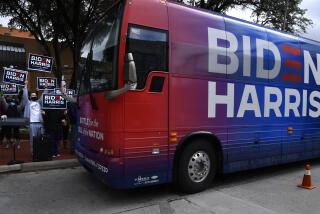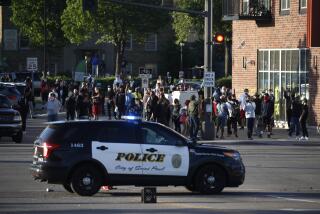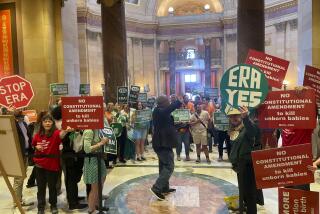In North Dakota, it could become legal to hit a protester with your car
- Share via
For months, opponents of the proposed $3.8-billion Dakota Access pipeline waged protests. They established a prayer camp and strung banners between trees. At times, they blocked roads and construction sites. They faced attack dogs, pepper spray, tear gas, rubber bullets and water sprays that turned to ice on their skin.
“We wouldn’t have been able to delay construction to this point if it wasn’t for us taking to the streets,” said Dallas Goldtooth, an activist with the Indigenous Environmental Network who helped coordinate the Standing Rock Sioux tribe’s months-long protests in North Dakota.
But a bill introduced last month in the North Dakota legislature could make the obstacles to protest even more formidable. The bill, still in committee, would make it legal for drivers to run over protesters who are standing in a roadway, clearing drivers of any liability, as long as their action was “unintentional.”
The bill is just one of a raft of new pieces of legislation that have been introduced around the country to discourage or criminalize protest — even as large demonstrations over environmental issues, police shootings and the policies of President Trump have been surging across the country.
Colorado, Indiana, Iowa, Michigan, Minnesota, Missouri, Virginia and Washington are all considering legislation that would variously impose stiffer civil and criminal penalties for protesters and award law enforcement broad discretion in dealing with them.
“We are at a moment of historical protest activity,” said Lee Rowland, senior staff attorney for the American Civil Liberties Union. “The idea that legislators’ response would be penalizing that speech rather than engaging it in conversation is really troubling.”
Those in power are being challenged — whether it’s Black Lives Matter, Native resistance, the Fight for 15, or women’s rights.
— Dallas Goldtooth, an activist with the Indigenous Environmental Network
Republican North Dakota state Rep. Keith Kempenich said he introduced House Bill 1203 in direct response to the pipeline protests. He said relatives of his got caught in them while driving on roadways last fall.
“This isn’t their issue,” Kempenich said, but “if something had happened, they’d wind up being accused of it.”
Lt. Tom Iverson of the North Dakota Highway Patrol said he was not aware of any pedestrian-vehicle crashes involving protesters. Whenever the agency has become aware of protesters blocking roads, it has closed them down to ensure the safety of both them and drivers.
Kempenich said the bill would not allow drivers to target protesters intentionally, and that they still have to slow down to “see and avoid” any potential collision. “I don’t see it being applied very often,” he said.
He also said he supports protesters’ right to demonstrate on sidewalks, in ditches or on road shoulders, but “there’s a line between protests and terrorism.”
When a protester “comes up on the roadway and challenges a motorist,” he said, “that’s an intentional act of intimidation — the definition of terrorism.”
For his part, Goldtooth saw the bill as part of a “terrifying progression” of recent measures.
“What it effectively does is allow people to potentially murder another human being simply because they’re standing in a public roadway with a sign,” he said.
Goldtooth called the bill and others like it “a knee-jerk reaction that carries the sour taste of racism.”
“Those in power are being challenged — whether it’s Black Lives Matter, Native resistance, the Fight for 15, or women’s rights,” he said. “That challenge causes a lot of fear.”
Goldtooth conceded that taking over roadways is against the law but said it was necessary sometimes.
“We’re out in the middle of nowhere fighting a pipeline where the only public space available is the road,” he said.
The right to protest is rooted in the 1st Amendment, which protects freedom of speech and of peaceful assembly. On the other hand, authorities can require a permit or impose narrow restrictions on very large or loud protests.
Protesters cannot obstruct pedestrian or vehicular traffic without a permit, though federal courts have ruled that the lack of a permit cannot be used to prevent protests in response to breaking events, said Rowland.
“Every city, town and county already has ordinances to deal with obstruction,” she said. “These bills may be dressed up as bills related to obstruction or insurance or public safety, but make no mistake about it, these bills are about one thing and one thing only: silencing dissent.”
In Minnesota, where protesters shut down Interstate 94 following the police shooting of Philando Castile last summer, and again after the election of Trump in November, lawmakers have introduced bills to categorize obstruction of roadways and public transit as a gross misdemeanor, which carries a penalty of up to one year in jail and a $3,000 fine. An ordinary misdemeanor carries a penalty of up to 90 days in jail and a $1,000 fine.
They have also introduced legislation that would make it a felony to knowingly obstruct any legal process, including an arrest, and that would enable local governments to sue convicted protesters to pay for law enforcement costs.
“If you want to violate a law, if you want to close a freeway, you ought to go to jail,” said Republican state Rep. Nick Zerwas, who introduced two of the bills. “And when you get out of jail, I think we ought to give you the bill for the riot that you caused.”
Zerwas said he had been contacted by a constituent who reported being unable to take her asthmatic daughter to the hospital during an I-94 closure because of protests; another lost the chance to say goodbye to a loved one because of a protest at Minneapolis-St. Paul International Airport that delayed flights.
He said the cities of Minneapolis, St. Paul and Bloomington had racked up $2.5 million in overtime costs for their police departments over the last 18 months.
“In Minnesota, we’ve gotten to the point where shutting down a freeway is just kind of the go-to move for protests,” Zerwas said. “There’s two things a law should do: It should deter somebody from committing a crime, and it should punish them if they have committed a crime. [The current law] certainly is not a deterrence,” he said.
Jordan Kushner, a civil rights attorney in Minneapolis who has represented Black Lives Matter protesters, disagreed.
“People don’t generally want to get arrested and charged with crimes,” he said. “There’s already deterrence in effect. How much retribution do you need?”
Kushner said the bills introduced in Minnesota reflect the broader racial tension in the state between white, suburban districts and the Republican lawmakers who represent them, and Black Lives Matter activists, who have been the driving force behind the major protests of the last two years.
He said the bills under consideration would cut off one of the last remaining outlets such activists have to express their grievances peacefully.
“What options are they leaving people who are dissatisfied?” Kushner said.
Twitter: @AgrawalNina
ALSO
Supporters say Dakota Access pipeline is back on. Activists counter: See you in court
Trump’s Justice Department may crack down on thriving pot industry, but is it too big to jail?
Utah is the land of ski runs, pristine parks and a really bad smog problem
More to Read
Sign up for Essential California
The most important California stories and recommendations in your inbox every morning.
You may occasionally receive promotional content from the Los Angeles Times.











